It’s the most natural and self-evident thing in life, isn’t it? You know, it happens anyway, automatically, without the need of our attention. However, if it stood still only for a couple of minutes, it would probably threaten our whole life …
No breath, no life.

We receive this essential tool from the moment of our birth, the so-called “whiff of breath” or “whiff of life”, and it will leave us while we leave this body and planet. We are deeply connected through our breath; connected with ourself and everything else. It reacts very subtle to every single impulse from the outer as well as the inner world. Breathing consciously gives us a decent amount of energy; this is nothing new for all of you who are familiar with the far eastern relaxation techniques: the so-called pranayama, chi, qui – life energy that we achieve through inhaling deeply, in a state of mindfulness. Breathe therapy or breathe work has shown magnificent effects used as a method to heal chronic lung diseases and mental conditions, such as anxiety or depression. At the same time, it’s the most natural way to get healthy again.
Effort, ambition, success – faster, better – we’re living far away from a state of internal calmness. We almost forgot the most essential things in life, which actually enable us to do everything we’re doing all the time. It is not necessary to control your breath 24/7, but if you’re taking time on a regular basis to pay attention to this precious gift of life, it will have a significant impact on your health, well-being and consequently also on your ability to deal with challenges and stress in life. It is primarily a relaxed mind that allows us going healthy through our all-day life.
“We have to learn to live our life as a human being deeply.
We need to live each breath deeply so that we have peace,
joy and freedom as we breathe.”
(Thich Nhat Hanh)
Do you feel being at the mercy of life and easily losing your awareness in stressful situations? Did you lose the access to your inner peace completely? Then be ready: you’re able to start in this very moment by accepting my invitation to read through the following lines, my friend.
~ Stress: The doom of your health ~
Stress: a modern expression with disastrous impact. It can also be described as an “alarm” sign of our body reacting to an outer stimulus.
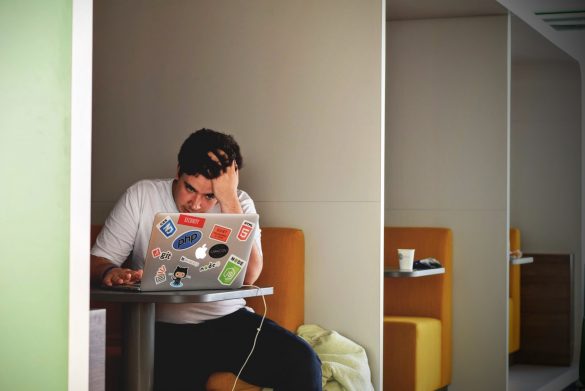 But first of all we need to distinguish the term “stress”: evolutionary based, we literally depend on this mechanism as it helps us to survive. In this state of stress, our senses become extremely sharpened in order to react instantly. It is part of our basic natural instinct of survival. The biochemistry of our body mixes up a hormonal cocktail, we urgently need to REACT in order to make sure that we are safe and able to survive.
But first of all we need to distinguish the term “stress”: evolutionary based, we literally depend on this mechanism as it helps us to survive. In this state of stress, our senses become extremely sharpened in order to react instantly. It is part of our basic natural instinct of survival. The biochemistry of our body mixes up a hormonal cocktail, we urgently need to REACT in order to make sure that we are safe and able to survive.
And here’s the essential part of of it: stress only becomes dangerous as soon as we are not able to let go of it anymore. Then, it becomes a chronic condition. When we are under stress, we attach and loose ourselves in the external world, we loose the connection to ourselves, to this very moment – an therefore, to our breath. At some point, we get sick. Physical signs such as pain, tinnitus, allergies as well as mental conditions, like a lack of concentration, forgetfulness, inattention may occur. Emotional effects appear in the form of overextension and discontentment. Addictions, depression, burnout. A cry for help from your voice deeply within.
“A few minutes of anger or stress takes us more energy
than an entire day of physical work.”
(Claudia Scheiderer)
We all know that chronic stress isn’t healthy. But what exactly happens inside our body when we sustain this state of rush, this feeling of excessive demand and pressure?
~ Our nervous system and stress hormones ~
Our so-called autonomic nervous system is the central switching point, which regulates all of the sub-conscious processes in our body. Thereby, we distinguish between two antagonists:
- The sympathetic nervous system is the active part. It provides us energy through performance-enhancing impulses, keeps us focused and awakened, but we also spend quite a lot of energy with an active sympathetic nervous system.
- On the contrary, there’s the parasympathetic nervous system, which becomes activated in a state of calmness and relaxation. It is responsible for our digestion, sleep and regeneration.
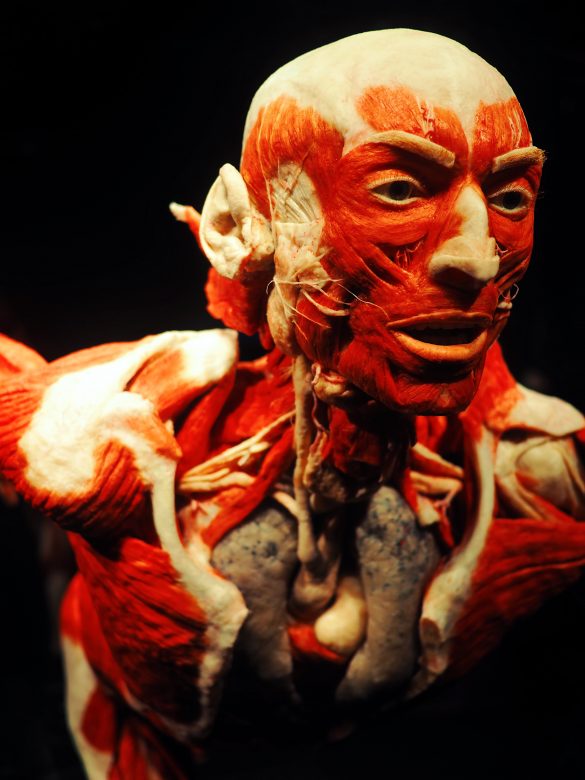 Both of them, the sympathetic as well as the parasympathetic nervous system, affect our organ systems, however, in an opposed way. For example, as the sympathetic nervous system increases our heart rate, our blood pressure, metabolism, energy expenditure and inhibits the digestive function, the parasympathetic nervous system works exactly the other way round.
Both of them, the sympathetic as well as the parasympathetic nervous system, affect our organ systems, however, in an opposed way. For example, as the sympathetic nervous system increases our heart rate, our blood pressure, metabolism, energy expenditure and inhibits the digestive function, the parasympathetic nervous system works exactly the other way round.
Stress automatically activates the sympathetic nervous system activity. If we don’t get enough rest, it will impact our entire system in an unhealthy way.
The sympathetic nervous system also induces the release of certain hormones, the so-called catecholamines: adrenalin and noradrenalin. As soon as these hormones enter our blood stream and bind to their target receptors, we receive the immediate sign: fight or fly! The muscles contract, tension arises, our heart-beat increases and energy is used. Besides, another hormone (glucocorticoid), the broadly-known cortisol, gets released to provide us energy. The immune system and all inflammation processes are blocked, while energy gets released from the liver and muscles (glycogen) as well as our fat tissue (fat storage) – after all, we need to be ready for ANYTHING and simply act!
A stressor (impulse) affects us from the external, we react and try to handle the upcoming stress. If we succeeded in dealing with the situation and let it go, we would eventually switch to a state of relaxation and calmness. However, if we continue to hold on to the external impulses mentally, which if I may mention are nowadays not considered life-threatening, the sympathetic nervous system continues to be active. In most of the cases, we start overthinking, we allow our monkey mind space to hop around from one bad thought to an even worse thought, we’re creating this mental prison filled with horror scenarios and instantly step into the feelings of anxiety, desperation, insecurity, we loose our self-esteem and thus, a state of chronic stress is pre-programmed by ourselves.
~ Activity versus Relaxation ~
Hold on for a moment: I’ve always been told that physical activity reduces stress, releases tension and reduces overthinking…?
Absolutely! That’s right. Being physically active helps you to release the accumulated energy within your muscles as well as to reduce the stress hormones in our blood stream. Therefore, we support our state of health in several ways, enhancing our mood and well-being while doing any kind of sports, as it releases other kind of hormones, endorphins, such as serotonin.
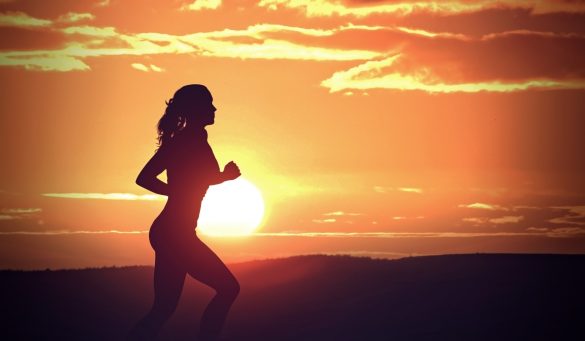
We challenge our body when we’re active, meaning our muscles need to regenerate afterwards, so sport is recommended to certain degree as it serves our health. However, inner peace and deep relaxation cannot be replaced by jogging or lifting weights.
“Relaxation means releasing all concern and tension
and letting the natural order of life flow through one’s being.”
(Donald Curtis)
When it comes to relaxation, to wind down from our daily duties, we instantly think of lying on the couch, most likely watching TV with a bag of crisps and some chocolate bars at reach. But this is not the kind of relaxation I’m talking about. Watching TV while eating alongside may help you distract yourself from the daily stress; this may work for a short amount of time. But on the long-run, it rather harms you as you simply resist your emotions inside while numbing them down through eating energy-dense foods and distracting yourself with some kind of movie. Thus, we’ll never receive a state of sustainable serenity, inner peace and the connection to our true Self.
Sleeping is probably the most intense tool to unwind completely and reach a state of profound rest. However, it is quite common to experience sleep issues while you’re under a chronic stress condition. Especially nowadays, as it is so hard for us to calm down and let go, more active relaxation techniques are a popular and good support. Yoga, for example, uses the breath very dominantly to receive this state of a calm mind. The breath is the bridge, the inseparable connection between body and mind – a very beautiful way of expressing its importance.
~ How do I find inner peace? ~
The phone rings, the children are calling you, your boss comes with a pile of new orders, you best friend is going through a hard time in her relationship, your mum is calling for some support and of course, your partner expects you to be fully present at home; and of course, the housework should be done as well. A vicious cycle comprised of pressure and stress, in which we can easily find ourselves lost and with no hope of getting out of it.
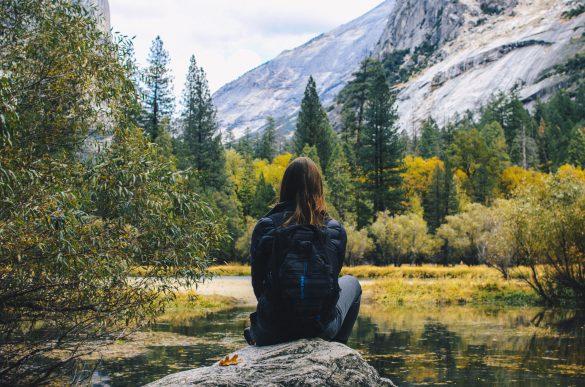
Imagine such situations or phases in life: when we sit down and try to solve these problems exclusively from a mental point of view, it’s mostly not successful. The hamster wheel in our brain won’t take a rest so quickly; it rather needs our awareness of what’s going on in our brain and the act of taming this monkey mind.
That’s where these aforementioned active relaxation techniques come into play. This might be
- yoga,
- pilates,
- autogenic training,
- tai chi,
- qi gong,
- progressive muscle relaxation
- or simply sitting in the sauna.
Those are ways that support you winding down on a more conscious level.
Also nature has a scientifically proven healing effect on our holistic system: body, mind and soul. Our immune system reacts through non-verbal communication with the trees. Forests and nature reserves do not only make you feel better, being in nature might also reduce anxiety and pain (Arvay, 2015).
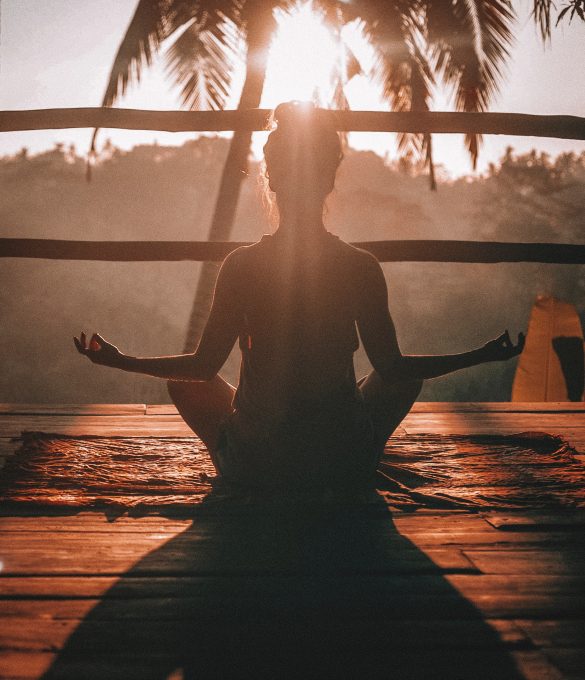 “You don’t always need a plan.
“You don’t always need a plan.
Sometimes you just need to breathe, trust, let go and see what happens.”
Meditation is definitely a key to your internal peace. Our breath is the most usable tool to step into this inner world as long as we pay our complete attention to it. A regular meditation practice will allow your parasympathetic nervous system to get enough space in order to initiate all the physical processes of relaxation. On an emotional level, we learn not to hold on to every single feeling that arises while focusing on this very present moment in silence; taking one step back, observing the thoughts and emotions, to see, feel, accept what is and let it go again. The effects of a regular meditation practice are so extensive, it would break the mould of this article’s topic. I’ll definitely bring it up in a separate article!
~ Conclusion: Strength lies in calmness ~
The state of total relaxation leads to recharge our physical, mental and emotional batteries. Physiological processes, such as the heartbeat, the metabolism and our breath all change, leading to a state of pure regeneration. Unfortunately, we neglect this essential part of self-care far too often and lose ourselves in external stimuli, which often induce emotional stress within us.
“A moment of patience can prevent a great disaster
and a moment of impatience can ruin a whole life.”
(Chinese Proverb)
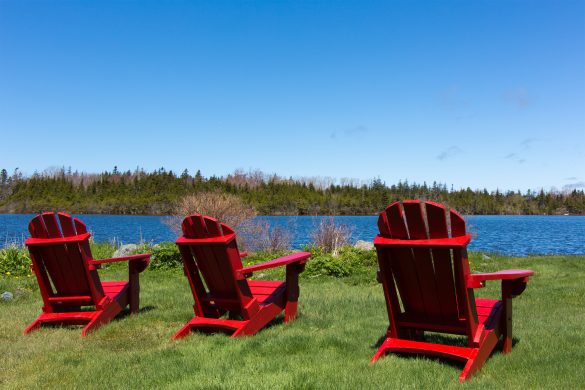
The breath is the gateway to our inner peace. When you start focusing on your breath for a few moments without any kind of distractions, you step into this exact moment, the “now”. Our mind receives the permission and possibility to rest for a moment, our body gets the chance to regenerate …
But it doesn’t need to be meditation in the very beginning of your practice. Active relaxation techniques, taking a walk in nature or going to the sauna are also profound techniques that will help you to calm down.
As for now, I wish you a vibrant day from the bottom of my heart. And don’t forget to “take a breath” in between…
All the best & lots of love,
yours Isabel!
Literature
Arvay C. Der Biophila Effekt. Verlag: edition a (2015), 3.Auflage.
Pictures
Unsplash (www.unsplash.com)
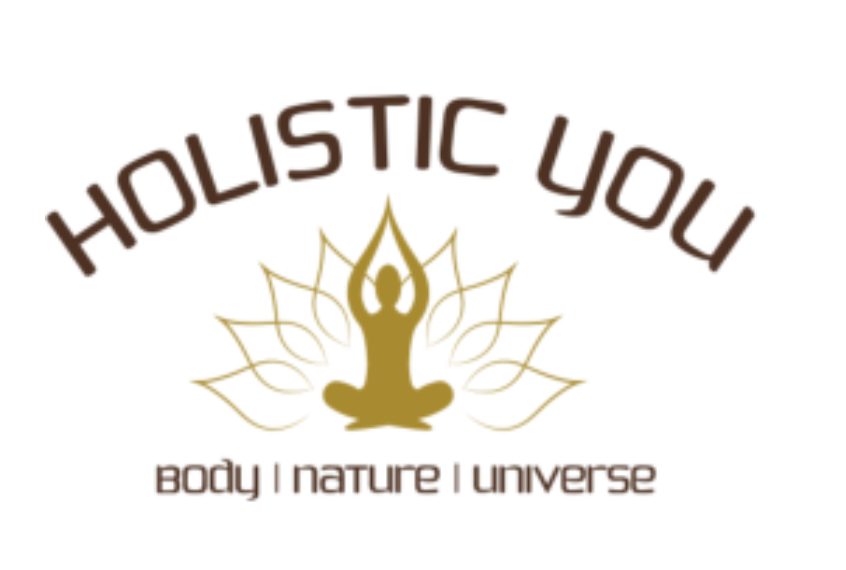
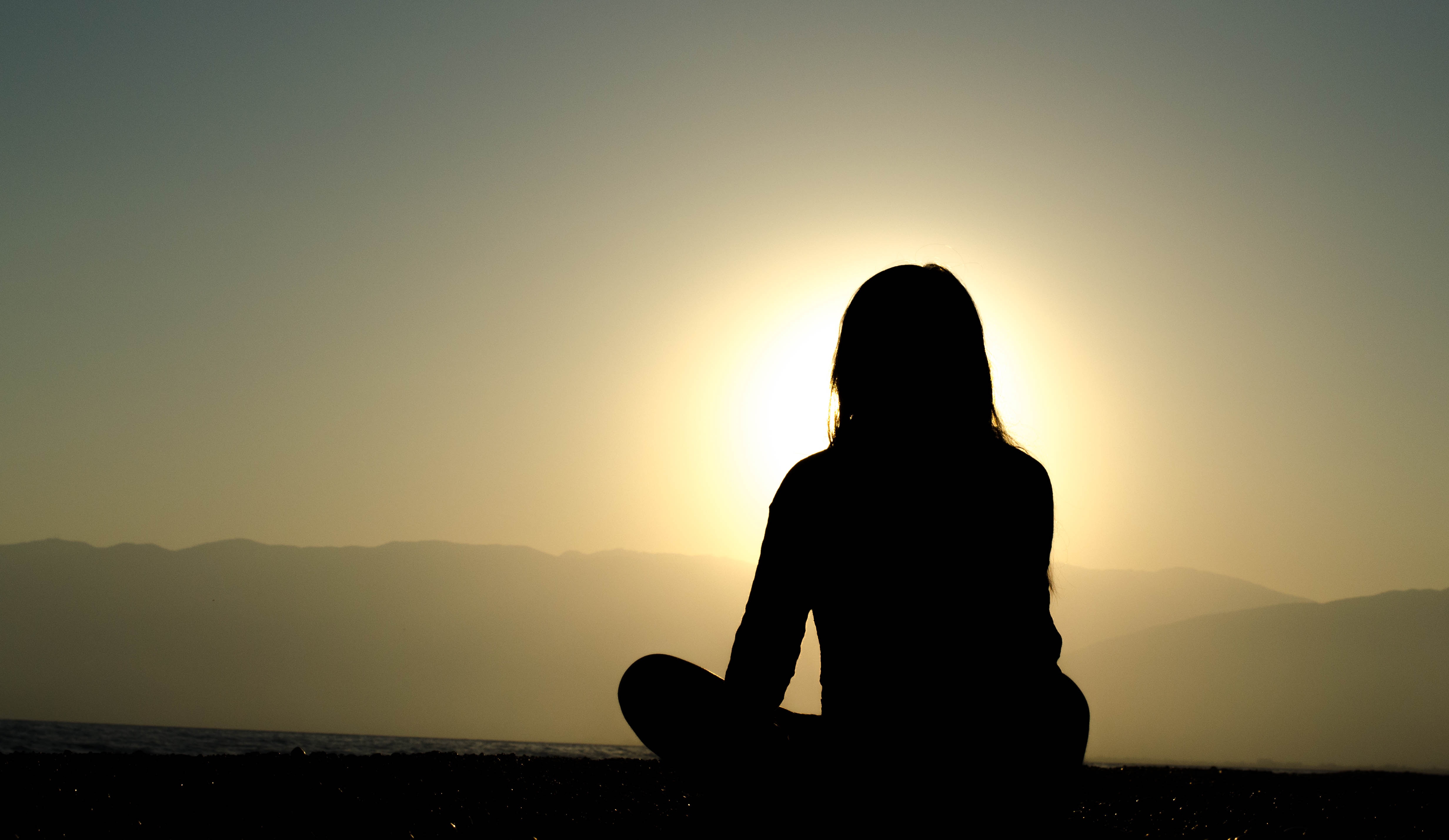
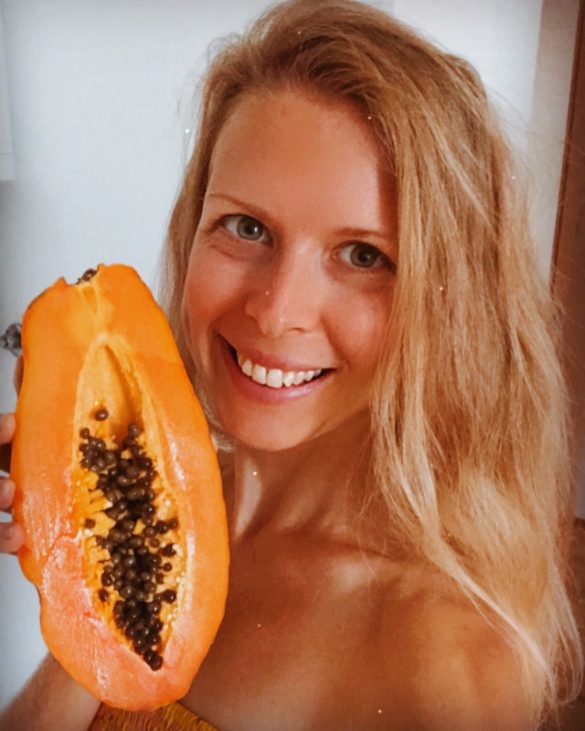
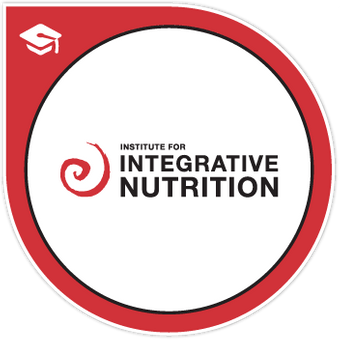

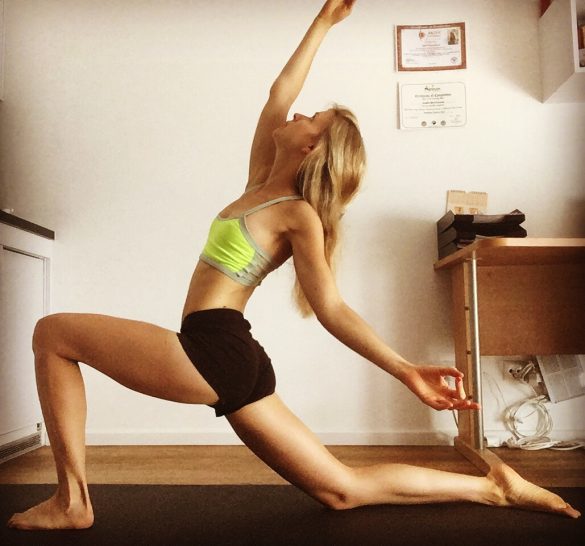
Four words “Loved to read it”.
Namasté, Vivek!
Sending gratitude, lots of love & abundance into your direction.
So nice to hear from you. Thank you very much!
Om śānti śānti śānti!
Liebe Isabel!
Wenn man Wellness im Alltag lebt geht alles leichter. 10 Min oder 20 Min oder eine halbe Stunde sich im Terminkalender notieren und es wie ein date mit sich selbst sehen. Ein kurzer Spaziergang/Nordic Walking vl gleich nach der Arbeit und auf den Atem hören, ein Wannenbad mit Duftölen oder Duftkerzen und auf den Atem hören, eine Entspannungsmusik beim Einschlafen und auf den Atem hören (Einschlafen ist gesichert). Es bewirkt Wunder, da spreche ich aus meiner eigenen Erfahrung.
Das Lesen deiner Seiten ist auch ein stressfreier Genuss, in diesem Sinne, stressfreie Zeit an Euch Alle da draußen.
Deine Mum!
Vielen lieben Dank für deine wunderschönen Zeilen zu meinem Artikel!
Liebste Grüße an dich zurück,
deine Isabel!